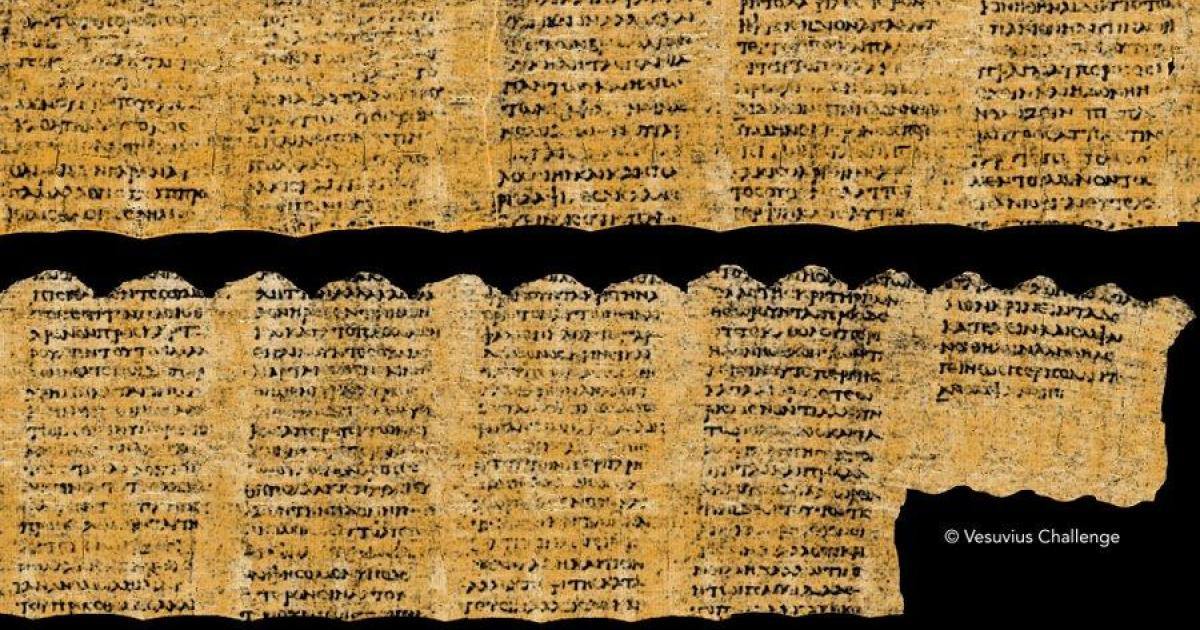Using artificial intelligence, three researchers have successfully deciphered a 2,000-year-old scroll that was damaged during the eruption of Mount Vesuvius. This breakthrough has the potential to “rewrite the history” of the ancient world. The Herculaneum papyri consists of approximately 800 Greek scrolls that were carbonized during the volcanic eruption in 79 CE, burying the ancient Roman town of Pompeii, as reported by the organizers of the “Vesuvius Challenge.”
The scrolls, resembling logs of hardened ash, are stored at Institut de France in Paris and the National Library of Naples. They have sustained extensive damage and have even crumbled during attempts to open them.
Click here to view related media.
click to expand
As an alternative approach, the Vesuvius Challenge conducted high-resolution CT scans of four scrolls and offered a total prize of $1 million to stimulate research on them. The team that was awarded the grand prize of $700,000 includes Youssef Nader, a PhD student in Berlin, Luke Farritor, a student and SpaceX intern from Nebraska, and Julian Schilliger, a Swiss robotics student.
Ten months ago, we launched the Vesuvius Challenge to solve the ancient problem of the Herculaneum Papyri, a library of scrolls that were flash-fried by the eruption of Mount Vesuvius in 79 AD.Today we are overjoyed to announce that our crazy project has succeeded. After 2000… pic.twitter.com/fihs9ADb48— Nat Friedman (@natfriedman) February 5, 2024
The group utilized AI to distinguish ink from papyrus and to decipher the faint and almost unreadable Greek lettering through pattern recognition. “Some of these texts could completely rewrite the history of key periods of the ancient world,” said Robert Fowler, a classicist and the chair of the Herculaneum Society, to Bloomberg Businessweek magazine.
The challenge required researchers to decipher four passages of at least 140 characters, with at least 85 percent of characters recoverable. Last year, Farritor decoded the first word from one of the scrolls, which turned out to be the Greek word for “purple,” earning first place in the First Letters Prize. Nader deciphered a few columns of text, winning second place. Schilliger won three prizes for his work on a tool called Volume Cartographer, which “enabled the 3D-mapping of the papyrus areas you see before you,” according to the organizers. Collectively, their efforts have now decrypted about five percent of the scroll, according to the organizers. The scroll’s author was likely the Epicurean philosopher Philodemus, writing about music, food, and the enjoyment of life’s pleasures, as per contest organizer Nat Friedman.
The scrolls were discovered in a villa believed to be owned by Julius Caesar’s patrician father-in-law. It is thought that the unexcavated property held a library that could potentially contain thousands more manuscripts.
Brent Seales
CBS News
The competition was conceived by Brent Seales, a computer scientist at the University of Kentucky, and Nat Friedman, the founder of Github, a software and coding platform acquired by Microsoft. As “60 Minutes” correspondent Bill Whitaker previously reported, Seales gained recognition for digitally restoring damaged medieval manuscripts with his own software. The recovery of previously unseen ancient texts would be a significant breakthrough, as only an estimated 3 to 5 percent of ancient Greek texts have survived, based on data from the University of California, Irvine. “This is the start of a revolution in Herculaneum papyrology and in Greek philosophy in general. It is the only library to come to us from ancient Roman times,” stated Federica Nicolardi of the University of Naples Federico II to The Guardian newspaper. In the final section, the author of the scroll “throws shade at unnamed ideological adversaries — perhaps the stoics? — who ‘have nothing to say about pleasure, either in general or in particular,'” according to Friedman.
The next stage of the competition aims to leverage the research to unlock 90% of the scroll, as noted by Friedman. “In 2024, our goal is to go from 5% of one scroll to 90% of all four scrolls we have scanned, and to lay the foundation to read all 800 scrolls,” the organizers stated.
The continuing discoveries at Pompeii
More from CBS News













